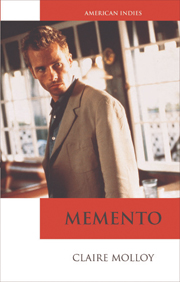Book contents
- Frontmatter
- Contents
- Series Preface
- Acknowledgements
- Dedication
- Introduction: Memento
- 1 Memento and Independent Cinema: A Seductive Business
- 2 Searching for a Slam Dunk: Marketing Memento
- 3 Puzzle Films, Ambiguity and Technologically-enabled Narrative
- 4 Memento as Noir
- 5 So What Really Happened? Memento, Fans and Online Interpretive Strategies
- Notes
- Bibliography
- Index
5 - So What Really Happened? Memento, Fans and Online Interpretive Strategies
Published online by Cambridge University Press: 05 August 2013
- Frontmatter
- Contents
- Series Preface
- Acknowledgements
- Dedication
- Introduction: Memento
- 1 Memento and Independent Cinema: A Seductive Business
- 2 Searching for a Slam Dunk: Marketing Memento
- 3 Puzzle Films, Ambiguity and Technologically-enabled Narrative
- 4 Memento as Noir
- 5 So What Really Happened? Memento, Fans and Online Interpretive Strategies
- Notes
- Bibliography
- Index
Summary
The whole idea was to make a film that bled into the mind a little bit, spun in your head, that you constructed very much yourself.
Christopher NolanFollowing Memento's release Internet forums began to buzz with discussion about Christopher Nolan's second feature, and debates continued for many months as hypotheses about various aspects of the film multiplied. These forums played a major role in creating word of mouth, especially in the first months of release when posts to online discussion groups made repeated recommendations that people should not wait for the DVD release but see the film immediately. As one poster advised: ‘Go see this film, drive to one of the select cities, it will be worth the ride.’ With Memento on limited release and opening predominantly on the art-house circuit in the US, many similar online posts recommended travelling to find the nearest art-house theatre where the film was playing. Given Memento's limited marketing budget online word of mouth was to prove particularly valuable and, as box office returns suggested, also effective.
As the buzz about Memento grew, explanations about the film changed as material from the film's website, interviews, critical reviews and later from the DVD and Jonathan Nolan's short story were amalgamated into hypotheses and used to confirm or develop interpretations. On one discussion board a thread that started after the North American release began with a comment posted on 18 March 2001, which asked: ‘What did everyone think about Memento's ending?’
- Type
- Chapter
- Information
- Memento , pp. 98 - 111Publisher: Edinburgh University PressPrint publication year: 2010



